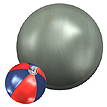
Softeners also help to increase the manufacturability. PVC has brilliant resistance to acids and bases, but is affected by some solvents. Soft PVC is exceptionally resistant to most chemicals.
Tubes made of PVC have the unique ability that they do not kink, i.e. stop the flow if bent. The poor weather resistance can be improved using additives. PVC has good barrier properties to atmospheric gasses.
Danish Name
Category
Products
World champion canoe
Garden hose
Electrical wire insulation
Vinyl flooring
Roof gutter
Vinyl record
Children's doll
Wrapping film
Medical transparent tube
Pneumatic chair
Processes
Plastic injection moulding
Rotation moulding
Plastic welding
Extrusion
Blow moulding
Film blowing
Similar materials
Thermoplastic elastomers
Keywords
Rubber like
Transparent
Wheather proof
Vinyl
Glossy
References
Wuppi Society for reuse of hard PVC
RGS90 (recycling of PVC)
Price
Environmen- tal notes
Use: PVC is self-extinguishing due to the content of chlorine. Soft PVC contains the softener agent DEHP which is under suspicion to reduce men's semen quality. Soft PVC should therefore not be used in contact with food.
Disposal: When PVC burns, strong hydrochloric acid emanates. Incomplete combustion can develop poisonous dioxine. PVC can be recycled and used in e.g. garden hoses. Heating value is equivalent to 1/4 kg of oil.
Photo
Copyright
This page is part of Design inSite
Disclaimer